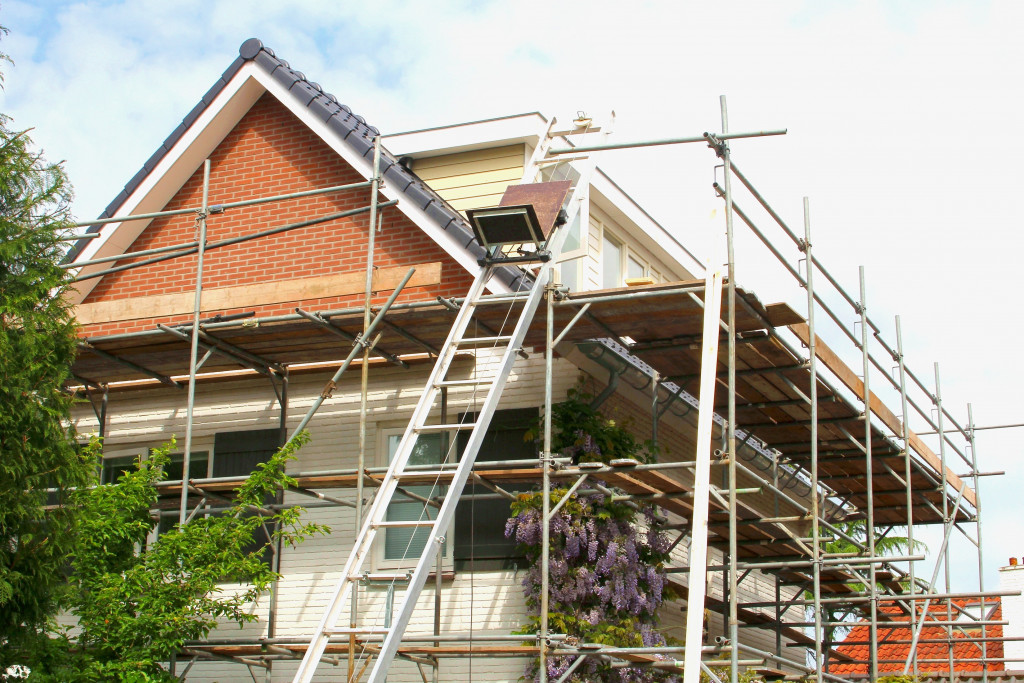- Investigate the area and properties for sale thoroughly, including soil conditions, pollution levels, and boundaries.
- Obtain all necessary permits and licenses from local authorities before building a house.
- Familiarize yourself with zoning laws and regulations to ensure that construction abides by them.
- Purchase adequate insurance coverage to protect your investment and engage a professional to survey the land.
Building a house is an exciting and complex process. But before you start, it’s essential to make sure that all the necessary steps are taken to ensure the safety of your home and family.
This article will discuss some essential pre-building steps to build a secure and safe house for your family. It’ll look at what kind of insurance coverage is needed, how to obtain proper permits from local authorities, and other considerations such as zoning laws and environmental regulations.
Buy the right property.

It can be daunting to shop for a property and secure the right one before building a house. Do your research for areas with an appropriate property for sale, investigate them thoroughly, and pay close attention to the documents you are presented with when purchasing. You should carefully evaluate such items as the surrounding area, soil disorder issues, pollution levels, boundaries, and other hazards; this includes consulting local resources like deed offices or real estate agents.
Negotiate on any deal to ensure it is affordable within your budget. At this point, making offers and dealing with paperwork becomes paramount in buying the right property. Lastly, safety checks through cautionary measures such as land document inspections are always necessary before purchasing any property.
Remember legal matters
Obtain necessary permits and licenses

Before embarking on a significant building project, such as constructing a house, researching the necessary permits and licenses from local authorities is an important step. Doing so not only protects you from any legal ramifications in the future but also ensures that your work will meet the required standards by local governing bodies.
It is best to thoroughly research the codes and regulations specific to your location to understand what you need to consider before the beginning of any structural plans. Additionally, contacting your planning department or local government may be beneficial in helping you better understand what is expected of you and empowering you to take appropriate steps in securing the needed permits and licenses.
Check zoning laws in your area.
One of the most critical steps to take when building a house is to check local zoning laws. You must be familiar with these laws so that your new home meets all requirements and follows any land usage regulations.
Before construction can even begin, secure the necessary building permits and licenses related to zoning. Research which ones you will need, as this can vary by locality. Better yet, consult a knowledgeable professional about the city or county’s zoning ordinance before deciding where the building might be allowed.
Research environmental regulations
Whether you’re an investor in real estate or an individual looking to build a house, understanding environmental regulations is essential. Simple measures like researching potential building sites and paying attention to zoning rules can ensure that your new property abides by any ecological restrictions.
Doing some basic research can save a lot of time and money down the line. It’s also beneficial to contact local regulatory agencies directly and ask any questions you might have regarding particular laws or specific sites. This way, you get first-hand information that could be crucial in deciding if building a particular property is worth pursuing.
Purchase adequate insurance coverage
When building a house, having proper insurance coverage is critical to mitigating the risks associated with construction work. Homeowners must evaluate all of their options and purchase adequate insurance coverage based on the type of work they are doing and their particular needs.
Working with an experienced professional can help ensure that you get the coverage you need at a price that fits your budget. Be sure to double-check all paperwork, read over any fine print before signing anything, and make sure you understand any exclusions and limitations of your policy.
Get a professional survey of the land
Before breaking ground to build a house, it is crucial to get a professional survey of the land. Not only does this ensure that you meet all the legal requirements for building in a particular area or municipality, but it can also help alert you to any potential risks associated with the property.
If there are overlapping property lines or access roads that need to be considered before starting construction, securing a professional survey can help bring these to light so you can work around them ahead of time. Furthermore, getting a professional survey done early on in the building process can help you identify any important details that may inform your design going forward.
These are just a few of the considerations that must be taken into account before building a house. From securing permits to researching environmental regulations and purchasing insurance, following the right steps ahead of time can help ensure that your new home is secure and compliant with all applicable rules and regulations.

